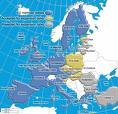Hilarious Political Satire: ‘Darkest Austria’ goes where ‘No Black Man has Set Foot Before’

Purporting to be an episode of “Other Countries, Other Customs: Kayonga Kagame Shows Us The World,” a production of the fictitious All African Television network, Darkest Austria (“Dunkles, Rätselhaftes Österreich) is a pitch-perfect 1994 mockumentary produced for Austrian TV.
It’s an audacious comic gem, in the same league as Look Around You and one of the funniest, most original things I’ve ever seen. Really clever, a minor masterpiece even. Certainly you will have never seen anything quite like it.
“Anthropologist Kayonga Kagame of Kinshasa University” (Actor Frank Oladeinde)
Darkest Austria is simultaneously a satire of National Geographic documentaries—they get the reverse condescending colonial tone down perfectly—as much as it is a send-up of Austrian culture, which is pretty… uniformly white. Monolithically so. The idea—brilliantly realized by writer/director Walter Wippersberg, a celebrated author of children’s books—was to get his countrymen to see themselves, their rituals and local customs as outsiders would see them. I’m guessing this is viewed as some kind of TV classic in Austria. It must be. It would hardly be possible to make something like this anywhere else!
As the on-camera host, ethnologist Kayonga Kagame explains, doing cultural research on Anglo-Europeans for the first time has many pitfalls, notably the delusional way the white man regards himself:
“The white man’s tendency to indulge in narcissistic self-analysis makes ethnographic research in Europe very difficult.
There is not one psychological or social phenomenon that has not been examined in scores of books.
As soon as the Europeans have written up their theories they start to believe in them. If you read these works of egocentric self-justification, you risk being taken in by the elaborate style in which they’re written and by their seemingly logical arguments. It is easy to end up thinking like the white natives that a curved line is straight, nonsense makes sense and the weird is normal.
If you want to keep a clear head avoid all white self-interpretation and rely on your own common sense.”
When the All African Television documentary team wanders into the darkest regions of the Eastern Alps, they are perplexed by such “patently useless activities” as bike riding for pleasure or mountain climbing, which is viewed as complete lunacy until they conclude that it’s a cult. Oktoberfest’s gluttonous goings-on are seen as Christian rituals, with beer steins and heaping plates of chicken replacing the wine and communion wafers. Money is termed “magic paper” and bemuses the visiting ethnologists. The activity called “skiing” where the local people line up to be chair-lifted to the top of a mountain only to slide down it and then repeat this over and over again all day long is seen as a symptom of an epidemic regression to infantile behavior.
When I first saw Darkest Austria I liked how it referred to an earlier program and assumed this was just a trope that allowed for the African documentarians to be “returning” to the Alps and to make it seem more real, but in fact, the film is not a one-off, there actually was an earlier film, Das Fest des Huhnes (“Festival of the chicken”) but sadly, I wasn’t able to turn up one dubbed into English on YouTube.
Posted by Richard Metzger


